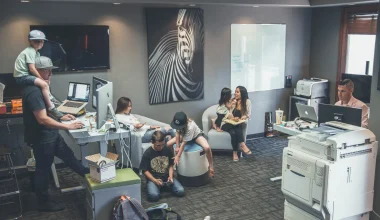If you’re looking for a job, you’ve probably heard about networking. But if you’re like me, the term can be confusing. It’s not just about wearing suits and handing out business cards at events — that’s called schmoozing, not networking. So what is it?
Networking is a way to find a job.
Networking is a way to find a job.
Networking is a way to find out about jobs.
Networking is a way to find out about companies.
Networking is a way to find out about industries.
And networking can also help you learn about job opportunities that are available within those industries, even if they’re not posted anywhere yet!
You can build your network while you’re still employed.
Networking is not just about finding a job. You can build your network while you’re still employed, and there are many ways to do so.
Join professional associations and attend their events regularly. Join social media groups that focus on the industry in which you work or want to work, and participate in discussions regularly (but don’t spam).
Volunteer for organizations whose mission aligns with your values and goals–and then stay involved! This shows that you have some skin in the game beyond just showing up once for an event; it also gives them more reason to keep tabs on what’s happening with/in their organization.(If nothing else, this will give them someone who knows their organization better than any other candidate could.)
It’s important to have a professional profile.
The most important thing a job seeker can do is create an online presence. This means having a professional-looking profile, and it also means making sure you’re present on other social media platforms like Twitter and Instagram.
You should never include anything in your profile that could come back to bite you later–like photos from college parties or pictures of yourself drinking beer out of a shoe (yes, those exist).
Your network will be more valuable if it’s diverse.
If you’re like me, you have a lot of contacts in your network. You know people who work in many different industries, and their experiences are invaluable when it comes to understanding how the job market works. But what if your network is homogenous? What if all your connections are in exactly the same field as yours?
If that’s the case, then I’d say it’s time for some new friends! A diverse set of connections can help you learn more about careers outside of your own industry (and maybe even get some great advice). More importantly though, having diverse networks means that when something comes up at work or out in the world–a trending topic on Twitter or a news story about something relevant–you’ll have someone else around who knows what’s going on too…and maybe even someone who can help out!
You can learn how to network from books, podcasts and other resources.
Learning how to network is a skill that can be learned. If you’re not comfortable with networking, or if it’s been a while since your last conversation, there are plenty of resources available for both job seekers and employers.
Books such as “”How To Win Friends And Influence People”” by Dale Carnegie are great for learning about communication skills. Podcasts like “”The Moth Radio Hour”” feature stories told by ordinary people who overcame obstacles in their lives through perseverance and determination–stories that will inspire both job seekers and employers alike! Videos such as TED Talks provide inspiration from some of the world’s most successful people who share their secrets about success with us all
Networking is an important part of the job search process for even the most well-qualified candidates.
Networking is an important part of the job search process for even the most well-qualified candidates. Even if you have all of the qualifications, experience and skills that a company is looking for in an employee, there’s no guarantee that they’ll hire you. But if you can demonstrate your value through networking, it can help seal the deal.
The truth is that networking helps everyone find jobs–not just those who need it most! It could be as simple as asking someone who works at a company where they get their coffee or lunch every day so that when they run into each other again down at Starbucks or Chipotle (or whatever), there’s already some friendly familiarity between them. Or perhaps it means reaching out to alumni from your alma mater on LinkedIn because they may know someone currently working at another firm nearby where there might be opportunities available now or coming up soon.
Conclusion
If you’re looking for a job, networking is an essential part of the process. You can build your network while you’re still employed and use it to find new opportunities when it comes time to move on from your current position. It’s important that your network be diverse so that there are people who can connect you with different types of companies or organizations in their networks; this will help increase your chances of finding employment quickly because there will be more people who know about what kind of skillset they need in order to fill a vacancy at their company but don’t yet have anyone available for hire!






